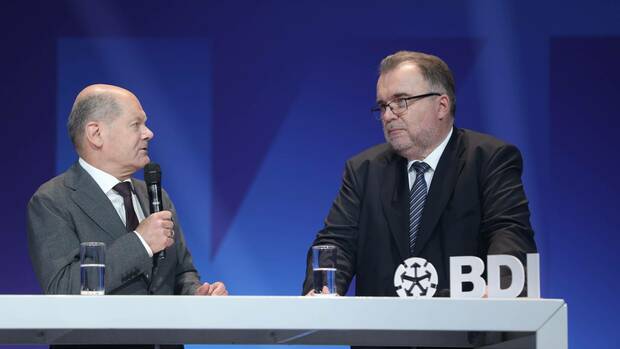Federal Chancellor Olaf Scholz tried to allay the worst concerns of the economy at “Industry Day”.
(Photo: IMAGO/dts news agency)
Berlin A single chip factory has triggered a fundamental debate: It is about Intel’s settlement in Magdeburg and the question of how much money the state should allow to bring industrial factories to Germany. The level of subsidies for Intel factory construction has been the subject of debate for months. The fact that the federal government agreed with the chip manufacturer on Monday to an increase from 6.8 to 9.9 billion euros and that Intel at the same time roughly doubles its investment sum to more than 30 billion euros should hardly mean the end of the debate.
The Intel deal is part of a trend to encourage industrial settlement through extensive government support. Chancellor Olaf Scholz (SPD) said at “Industry Day” that further semiconductor settlements were “in the starting blocks”. Germany could become one of the largest chip locations worldwide.
But the federal government also wants to rely more on state subsidies in other sectors. The steel company Thyssen-Krupp, for example, can count on a subsidy of two billion euros to convert its steel production to green. The Swedish battery producer Northvolt is to be lured to Schleswig-Holstein with state funds.
Criticism of subsidies as a central means of industrial policy has always come from the economy. But now it is the recipients of the funds themselves who are asking whether all of this is sustainable. The criticism coming from business is harsh. “Bureaucracy and unnecessary rules have to go, that would help, and not more and more industrial subsidies,” said Karl Haeusgen, head of the Association of German Mechanical and Plant Engineering (VDMA), the Handelsblatt.
The CEO of the industrial service provider Bilfinger, Thomas Schulz, would like to see more reliable framework conditions instead of state aid. “As an industry, we need long-term, resilient decisions based on facts and honesty – and not ideology,” the head of the company with 30,000 employees told the Handelsblatt.
Tough exchange of blows between Chancellor and BDI President
At “Industry Day”, Chancellor Scholz tried to allay the worst concerns of the economy. He is firmly convinced that the state is not the better entrepreneur, he said in Berlin and added: “That’s why we are relying on market forces for decarbonization.” working conditions. Scholz cited the immigration of skilled workers as an example.
However, many of his listeners did not share the view that the state trusts market forces, above all the President of the Federation of German Industries (BDI), Siegfried Russwurm. Many projects of the ministries would be reminiscent of “economic surveillance”. Scholz’ announcements such as the reduction in bureaucracy would hardly be reflected in the government’s actions. “It doesn’t work that way,” said Russwurm.
>> Read here: Comment: Invest yes – but do it right!
The economy demands an investment-friendly environment as an answer to the subsidy programs in the USA and in China: more predictability, less bureaucracy. “The skills of the industry are needed more urgently than perhaps ever before. Our message to the federal government is therefore to trust in us,” says Mechanical Engineering President Haeusgen.
Hans-Toni Junius, managing partner of CD Wälzholz, a global metalworking company with 2,300 employees, warns that high interest rates, great uncertainty in assessing future developments and the “conspicuous loss of international competitiveness” are leading to a strong reluctance to invest in the industry. “To cope with the obvious crisis, a spirit of optimism would be required in politics and business, of which there is no sign,” said Junius.
Although the Federal Ministry of Economics has announced an industrial strategy, this is still a long time coming. According to information from government circles, the presentation was originally intended for “Industry Day”. In the meantime, however, one is aiming for early autumn.
This is also due to the fact that the federal government has not yet clarified a fundamental question: it is about the decision as to whether an industrial electricity price should be introduced. Economics Minister Robert Habeck (Greens) recently proposed a discounted electricity tariff for industry, and large parts of the SPD have been demanding it for months.
Christian Kullmann, head of the chemical group Evonik, is urging rapid implementation. A secure supply of green electricity at affordable prices is needed quickly. “Ideological blinders should not determine political action, but reason must guide us,” said Kullmann.
Kullmann calls for a secure supply of green electricity at affordable prices.
(Photo: imago images/Political Moments)
Chancellor Scholz, however, was recently skeptical. At Industry Day he left out the topic. Basically, he said Germany must return to “fiscal policy normalcy.”
Finance Minister Christian Lindner (FDP) rejects an industrial electricity price and refers to a lack of funds in the budget. The cost of a state-subsidized electricity price is expected to amount to 30 billion euros by 2030. Instead, Lindner proposed a reduction in the electricity tax at the Industry Day.
More: Where own plants in Europe pay off – and where not
